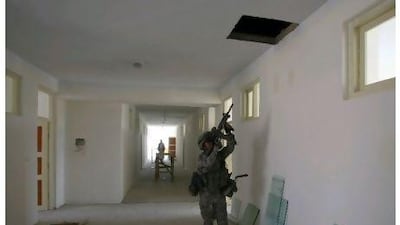WASHINGTON // The US has lost billions of dollars to waste and fraud in Iraq and Afghanistan and stands to repeat that in future wars without big changes in how the government awards and manages contracts for battlefield support and reconstruction projects, independent investigators said yesterday.
The Wartime Contracting Commission urged Congress and the Obama administration to quickly put in place its recommendations to overhaul the contracting process and increase accountability. The commission even suggested that the joint House-Senate debt reduction committee take a close look at the proposals.
"What you're asking for is more of the same," said Dov Zakheim, a commission member and the Pentagon comptroller during George W Bush's first term. "More waste. More fraud. More abuse."
The bipartisan commission, created by Congress in 2008, estimated that at least US$31 billion (Dh113.8bn) and as much as $60bn has been lost in Iraq and Afghanistan over the past decade due to lax oversight of contractors, poor planning, inadequate competition and corruption. "I personally believe that the number is much, much closer to $60 billion," Mr Zakheim said.
The commission's 15 recommendations include creating an inspector general to monitor war-zone contracting and operations,
"If these recommendations are not implemented, there ought to be a Hall of Shame," said Michael Thibault, the co-chairman of the commission.
Representative John Tierney, the top Democrat on the House Oversight and Government Reform national security subcommittee, said that the commission's findings are "alarming". Mr Tierney said he plans to introduce legislation next week to create the inspector general's post.
Senator Claire McCaskill, a Democrat and chairwoman of the Senate's contracting oversight subcommittee, said she plans to prepare legislation based upon the commission's recommendations.
The commission's report said contracting waste in Afghanistan and Iraq could grow as US support for reconstruction projects and programs wanes. That would leave the countries to bear the long-term costs of sustaining the schools, medical clinics, barracks, roads and power plants already built with American money.
Overall, the commission said spending on contracts and grants to support US operations is expected to exceed $206bn by the end of the 2011 budget year. Based on its investigation, the commission said contracting waste in Afghanistan ranged from 10 per cent to 20 per cent of the $206bn total. Fraud during the same period ran between 5 per cent and 9 per cent of the total, the report said. Fraud includes bribery, kickbacks, bid rigging and defective products, according to the commission.
"It is disgusting to think that nearly a third of the billions and billions we spent on contracting was wasted or used for fraud," Ms McCaskill said.
Styled after the Truman Committee, which examined World War II spending six decades ago, the commission had broad authority to examine military support contracts, reconstruction projects and private security companies.
But the law creating the commission set this September as the end of its work, even as contractors continue their heavy support of US operations in the war zones.
Security, transportation, food preparation and delivery, and much more are now handled by the private sector. At the same time, the officials responsible for monitoring contractor performance have been overwhelmed by increasing reliance on private companies.
"We are far more reliant on contractors than we ever were," said commission member Charles Tiefer, a professor of government contracting at the University of Baltimore Law School. "We always bought munitions from them. But we didn't used to buy much in the way of services from them."

